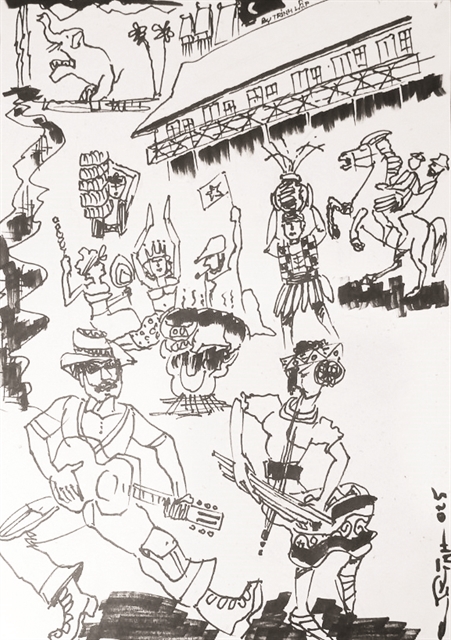Bản Liền in the northern province of Lào Cai now can stand well on its stilts to face unprecedented popularity after a reality show.

Illustration by Trịnh Lập
Nguyễn Mỹ Hà
The reality TV show Gia đình haha (Ha ha Family) has been appealing to millions of viewers over the past few weeks as five young artists spend time living with a Tày ethnic family in a stilt house in Bản Liền, a beautiful country home in the northern province of Lào Cai accessible only by motorbike or on foot.
The young members of the show live with the family, joining them in doing their daily routine including tending their water buffaloes and horses, feeding poultry, weeding their tea garden, and taking care of their pet dogs and cats.
On top of this, the host family has two small children who go to boarding school and come home for the weekend, ageing parents to take care of, and a raft of community activities including heading a song and dance troupe.
Vàng Thị Thông, the Tày woman in the show, has become an idol for many people. While men adore her strength and beauty, women see themselves in her as a hardworking multitasker, yet very powerful and graceful with her femininity.
While working hard, she gets to have some fun, too, wearing beautiful clothing with silver jewellery, playing football wearing a traditional tunic, and singing and dancing at times when the farming work is a bit less hectic.
With national attention, Thông could be the type of person voted as Việt Nam's most influential woman of the year, or even receive a Labour Order from the state, for she has been the most inspiring face in the country after only a few episodes of the show.
We got to meet Thông and her family some five years earlier, when we went on a field trip to Bản Liền with a community-based tourism programme administered by the Centre for Rural Economic Development (CRED), a non-profit NGO funded by Helvetas, the Swiss Development Organisation.
CRED had reached out to the community, training people to open their homes for tourists in homestay services, invest in building new hygiene restrooms, and offer new bedding and curtains.
They learned to cook some basic international meals such as banana crêpes or mashed potatoes, and make their traditional food into a bountiful tray of nutritious and exotic feast that anyone would love to take a picture of before eating.
We met Thông at her home, where she and her husband had built their house on the land his parents had previously owned. They work their small terraced fields with their little sticky rice mound on top, much smaller compared to many other terraced fields in Việt Nam. But for one family, it's already a back-breaking job to even cultivate only one crop a year.
Before the Gia đình Haha show, a few houses at Bản Liền had already opened their homes up for homestay, leading trekking tours for tourists. Residents also already spoke some English with visitors from all over the world.
But after the show aired, Thông's homestay was quickly fully booked up for the next three months, and often she is awake past midnight answering fan messages sent to her inbox.
She has also introduced other families in the community who have also been offering homestays, such as Lâm A Nâng and Vàng A Bình. They all belong to the Tày group and are related to each other in some way or another.
When the show started to air, singers and songwriters gave it a special allure. Their fans often like to see their idols in a new setting, writing new songs and singing on the spot.
Bùi Công Nam, for example, wrote positive and healing prose about the locality, and said it was because he had met an extraordinary personality in Thông, as well as each member of her family.
But with fame comes other issues that must be ironed out.
"If the show becomes too popular and mass tourism rushes to the community, it will inevitably destroy the landscape," said Thái Huyền Nga, a CRED programme officer who went up to Bản Liền to meet visitors.
"I'm afraid that everyone would want to do homestays, as Bản Liền adapts to the influx of tourists," she said. "I'm also afraid that other people, those who stick to farming, would not like to have too many tourists in their community."
Other viewers of the show also raised their concern about protecting local families' rights, for not having a legal aide to help them. If one family could benefit from the tourism influx, some said, then other families in the community must also feel the positive change.
Local government and programme officers noted that even if visitors decide to stay in only one or two homes, other households could provide side services, such as offering taxis to take them around the area, trekking tours, providing food, or performing entertainment.
Thanks to the preparation work of CRED, Bản Liền now can stand well on its stilts to face this unprecedented popularity, when even the dog, the cat, and the buffalo of the family catch the hearts of so many people. VNS